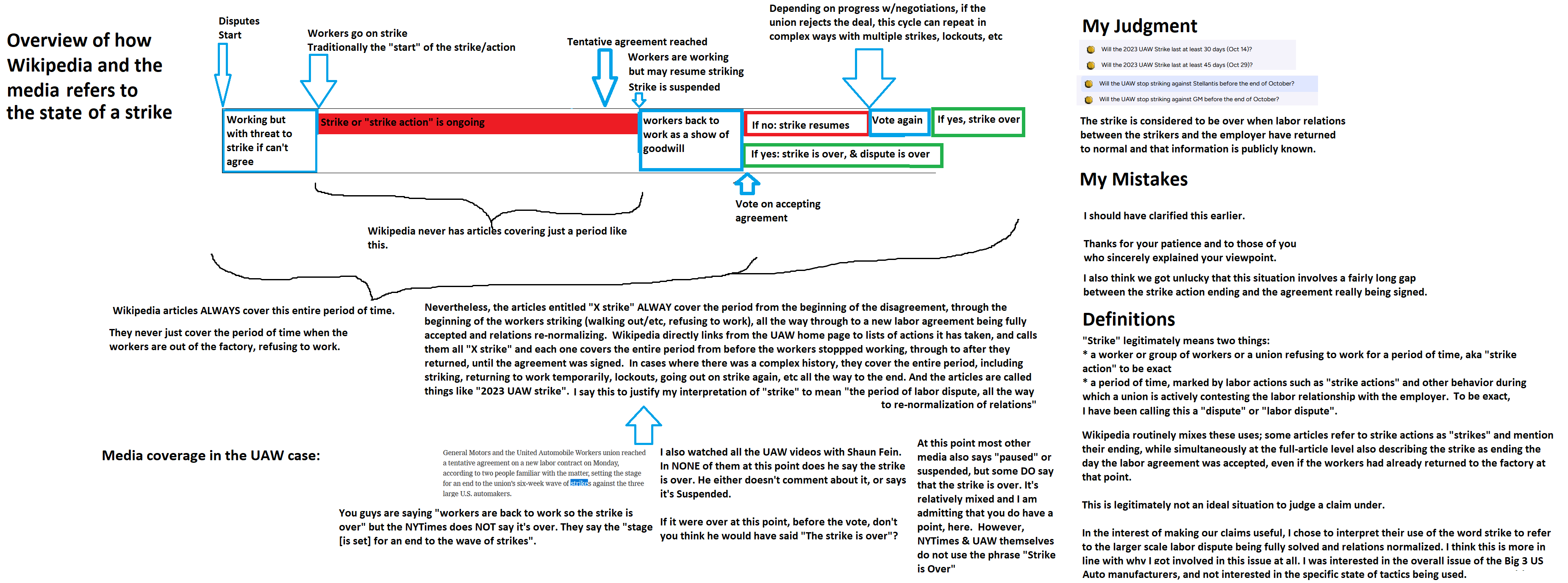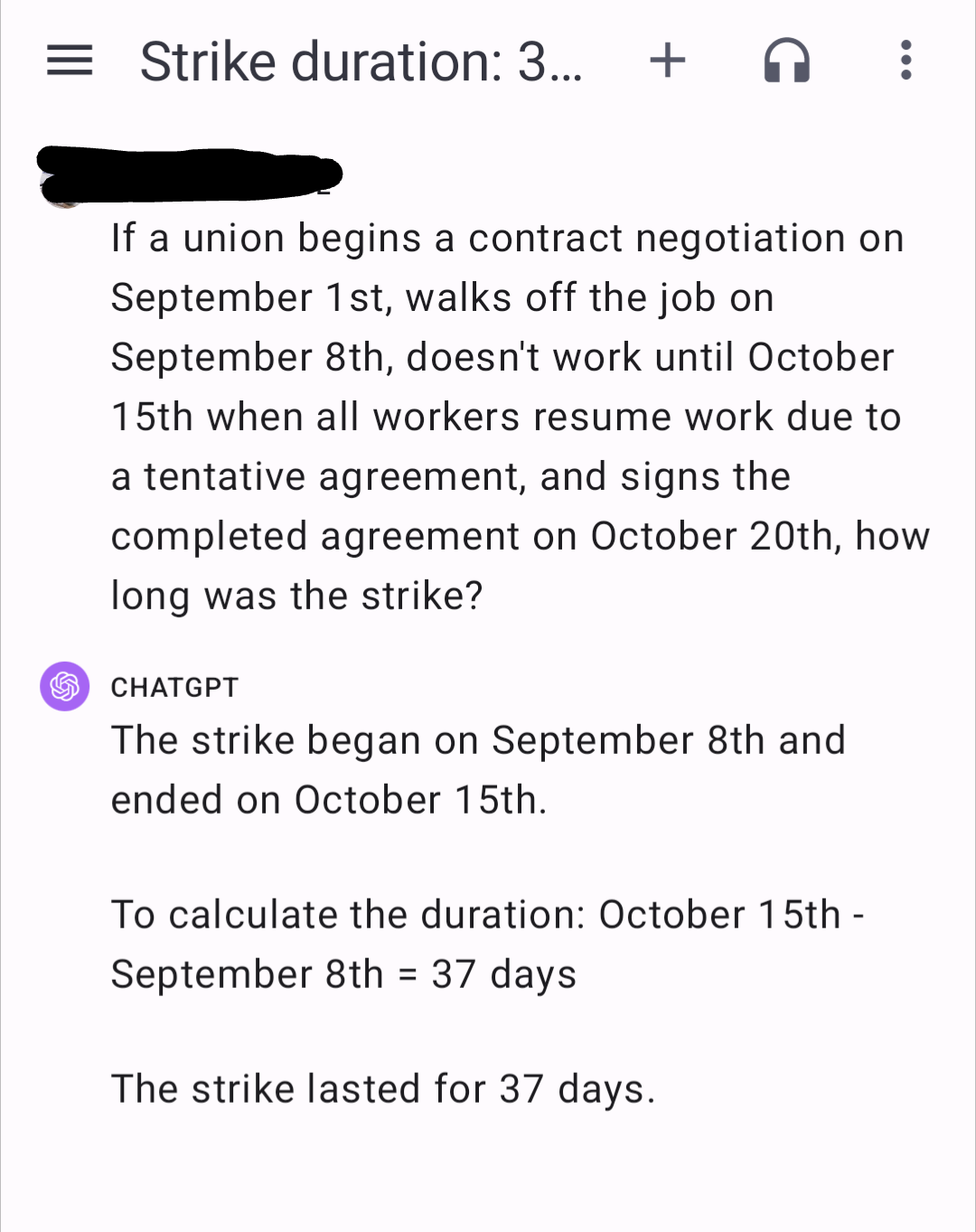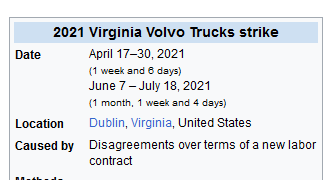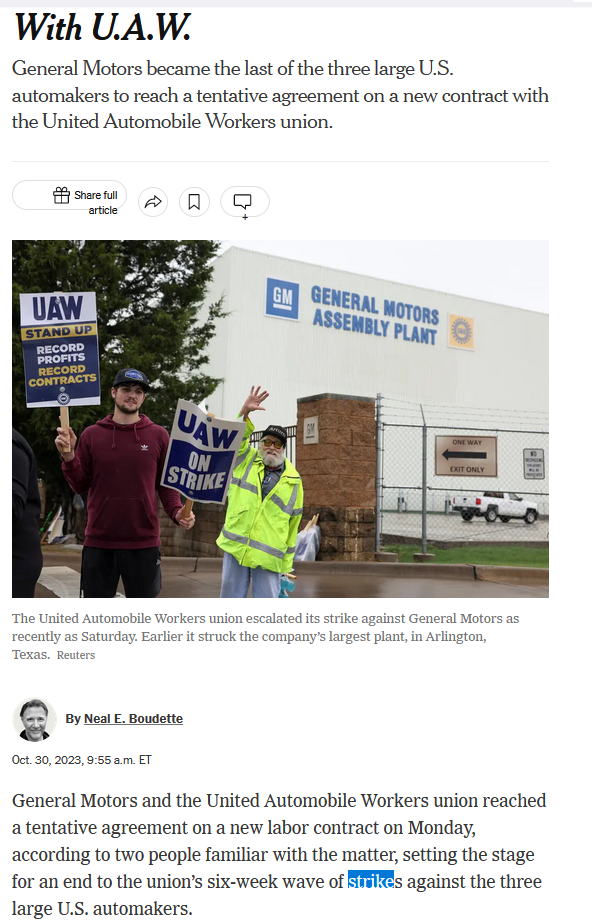
Hey strike-fans!
This is the perfect double crux:
I believe that Shawn Fain INTENTIONALLY is avoiding saying "The strike is over" because in his mind, "strike = labor dispute" and it will only be over when the new agreement is reached.
He's very carefully avoided saying it's over this whole time.
If you are one of the people who are insisting "the strike is over, they aren't striking", what is your explanation for this? Don't you think it's weird that the HEAD of the UAW hasn't declared the strike over?
Nevermind all that: I've bid it up to 90% here. So if you think you are right enough that Shawn Fain would agree with your view that "not working = strike over", just bet here at 10:1 odds and steal my mana:
/Ernie/only-when-the-uaw-labor-agreement-i
If you scrupulously avoid betting or ever commenting again, yet still leave up your comments, well, I think you are in a very good position to understand the position of the LK-99 researchers.
*********************
NOTE: I am discussing resolution criteria in the comments. Please jump in; latest views are at the top.
****************** ABOUT THIS DISCUSSION MARKET************************
It's just a placeholder. Will resolve to market price but that has no other effect. This will be input to how to resolve the related markets on when the UAW strikes will end. It isn't definitive, but this is a place for us to discuss.
YES - strike is over when workers return to work. This means that if they return to work, but then stop again, it's a NEW strike? That is weird.
NO - when the deal is signed. This means that if they start working again, and only sign a contract a month later, the strike was on for a month while they were negotiating (weird).
🏅 Top traders
| # | Trader | Total profit |
|---|---|---|
| 1 | Ṁ11 | |
| 2 | Ṁ9 | |
| 3 | Ṁ7 | |
| 4 | Ṁ4 | |
| 5 | Ṁ3 |
OK @Ernie @Panfilo, just in case you two still think you are correct, here is the press release from the UAW today. This is presumably the final one, as all workers are now under new contracts.
I'll direct your attention to the only sentence that (really) references the strike, which is the first sentence:
"After the historic Stand Up Strike, UAW members at Ford, General Motors and Stellantis have voted to ratify their new contracts, locking in record gains at the Big Three automakers."
Removing extraneous words, the sentence is: "After the strike, members voted."
So I just want to close the door on two myths that were perpetuated by you two:
"The strike is not over until they vote." The UAW disagrees with you. The strike ended, then they voted to ratify the new contracts.
"The UAW will say the strike is over after they ratify." They did no such thing. In fact, it the opposite, the votes happened AFTER the strike.
Hopefully some lessons learned here!
/Ernie/only-when-the-uaw-labor-agreement-i
This seems conclusive. If it resolves YES, my decision will have been correct. If no, I'll have been wrong at least from UAWs POV
@calm It is VERY frequent for workers to keep working with expired labor agreements while the two sides negotiate. This is not a strike.
Stand-up strike means the union was picking and choosing who is on strike, so i.e. instead of 10,000 UAW workers all walking off the job at once, they assigned a few hundred here, a few hundred there, etc. with the threat to expand the strike if management did not come to a deal. It was a gradually expanding strike.
.
@Ernie surely there must be an option where no agreement is signed and the company survives without the striking workers
@Odoacre I don't know, we'd come up with something. I imagine that in that case the workers give up or leave the industry. The relationship is never renormalized since it's over. Same as if either party dies..
You could make a similar argument against my definition by asking "what if the factory burns down and the company is out of business, doesn't that mean the relationship never normalized, therefore, strike is still on?"
I don't think it's convincing.
I have made this infographic which explains my reasons and interpretation of how I think about strikes and when they end, and how that might be interpreted. Thanks everyone for your sincere feedback!

https://www.fox2detroit.com/news/whats-next-in-big-3-ratification-process-after-automakers-reach-deals-with-uaw This local news source (which has been reporting on the story closely and frequently) is using the language of "suspended" for the current status of the strikes, which is also the stance that union leadership has been taking. It's also what I think is technically accurate.
@Panfilo yes. As does the NYT
If something is suspended it doesn't mean it's over. It's closer to paused. That's why I'm going to consider the strike over when it's over due to a new mutually agreed on and public labor agreement
@Ernie Really amateurish here. You are elevating your interpretation of a specific word over reality. The reality is that nobody is on strike right now, and everyone is back to work. The resolution of markets should cohere to reality. The strike has stopped. Whether that changes in the future is moot.
I'll also explain why using the language as as a crutch is silly: if the union used the word "halted" instead of "suspended", what would you do? What about if they used the word "ceased" or "paused" or "finished"? There are various ways you can describe something ending with the possibility of re-starting in the future if XYZ happens. In the WGA markets, the strike ended when they went back to work. We didn't wait weeks for them to vote on the deal, because strikes end when people are back on the job. If they vote down the deal, the strike "re-starts" or "un-pauses" or "un-suspends" or again any number of terms you want to use.
If you get into the weeds on language and ignore reality, you can easily get lost in minute details that simply do not matter to the question you are asking. And you are hopelessly lost here.
@Domer I'm sorry it's unclear and I'll try to make the resolution criteria more exact in the future. As stated in other comments I believe the strike is clearly not over since in many similar cases upon rejection of a deal workers would immediately stop working again. In such cases it's usually not called a new strike but a continuation of the previous one. If such a thing happened here and I had already called it over we'd be in a pickle. That's my decision.
One more data point: WGA strike market was resolved when the WGA called off the strike (September 27), not when the contract was ratified (October 9). https://manifold.markets/MarcusAbramovitch/will-the-wga-strike-end-by-septembe
Note: I'm not here because I care about individual strike actions. I think we're here because we care about "Will the big 3 suffer greatly from labor issues this year, such that it helps Tesla, leads to a bailout, impacts the election, influences EV transition, etc"
None of us care if there are 1, 2, 3, or 10 strike actions. We care about if the big3 can reach a labor agreement which, on a long timespan, significantly reduces future expectations of labor problems. Not a temporary agreement which in many cases in the past has meant little.
Resolving these markets based on a "strike action" interpretation would weaken their meanings re: the big question! But resolving them according to "is the dispute over, in real terms" satisfies what my goals were, and what I assume you all's were. That's why I'm resolving them that way.
@Ernie I didn't have any of that context when I stumbled onto this market. I saw "when will the strike end?" and I made bets based on the market title and description, using my understanding of the word strike.
As the market maker, you are free to resolve as you see fit. However, I think it will cause some surprise. I don't see any data to back up your assertion that market participants share your beliefs of "we all care about..." and "none of us care if...".
@MCMillennium I think most of us assumed "strike end = problem solved" but now we discover they are not identical. I have to choose which to honor.
As a participant, do you feel that you were mainly interested in "strike action ending regardless of dispute impact" more than "how long will dispute go on"? If the former, then that would make sense. But for me, I clearly mostly cared about the big3 impact.
@Ernie I don't think I agree about the values of the betters, but I do agree that folks, including me, have actually learned meaningful distinctions in how strikes (and UAW in particular) function that are more than just semantics, and which reasonably effect resolution.

GPT-4 seemed to believe the useful interpretation is the length of time spent not working here. If I were trying to plan out a labor negotiation, I would want to know how long I would have to pay union members who were not working. Or if I were trying to forecast GM vehicle production, I would want to consult with a prediction market that would tell me when workers would resume work.
Looking at random wikipedia pages about strikes:
they all use "strike" to refer to the entire dispute from leadup, first walkout/strike action, aftermath, and resolution
within that they do sometimes cover multiple "strike actions". But the pages generally cover the entire "dispute"
They seem to repeat the inconsistency found in articles - in some sections about specific strikes/strike actions, they say things like "the strike ended day X" but the overall article timeline covers a longer timespan. And later in the article they continue describing the happening of the strike as if it had not ended upon cease of a walkout; they generally continue until resumption of normal relations.
I am claiming this supports my interpretation, that a wikipedia strike page refers to the entire dispute, even though locally a strike also means the use of a specific tactic.
If you disagree please reply. I am planning to use this metric to resolve my strike related markets.
This article about a strike explicitly makes it clear: https://en.wikipedia.org/wiki/2021_Virginia_Volvo_Trucks_strike#Course_of_the_strike
The main page entitled Volvo Strike nevertheless covers multiple strike actions. Although it does list the timeline separating out the actions for special notice, the page itself covers both of them, as well as the leadup to and aftermath.
I take this as quite strong evidence to my claim that wikipedia pages about "X strike" actually cover the entire process, even when it contains multiple internal sub-strike actions, returns to working, rejection of contract and restarting/creating a new strike. they're all part of the same "strike"
Another example where wikipedia uses the agreement signature date as the "end", and not the "cessation of walkout" as the end.
https://en.wikipedia.org/wiki/2022%E2%80%932023_HarperCollins_strike (tentative agreement feb 9th, workers agree to return to work on feb 21, and sign the agreement feb 16. strike end date is listed as feb 21 and that makes sense since it's the first time both 1) workers are back 2) agreement has been signed)
https://en.wikipedia.org/wiki/1979%E2%80%931980_International_Harvester_strike#Background
Another strike page where the physical "strike" section says it ended one day, but the entire page timeline says the "strike" ended at the point which contained both 1) cessation of "strike action" AND 2) formal agreement
https://en.wikipedia.org/wiki/2021_St._Paul_Park_refinery_strike
This article has a strike, which converts into an attempted return to work & lockout, which converts to a strike again. Its' all covered in a unified fashion, including leadup and continuing until signing an agreement, which is listed as the end of the strike.
I think this is definitive. I linked to wikipedia pages about the UAW strike in many of my markets, wikipedia treats such pages as covering the entire dispute, and it also makes more sense to make predictions about a dispute rather than just a single strike instance. Particularly in this case, where on a per-factory basis, workers were often stopping work, then returning, then stopping again across the three companies. The "strike" was clearly the overall, union-managed process of pressuring the companies to negotiate. And at the end they made clear that the return to work was not a final resolution, as Fein said - he clearly said the agreement is NOT final and is only tentative, and that the actual issue will end upon union acceptance of the proposed agreement.
So, I am going to resolve my markets based on these principles.
"Strike" refers to the labor dispute. It resolves when the dispute is legally and conceptually full over and things have returned to "normal".
@Ernie If "strike" meant labor dispute, you would not have to clarify that when you said "strike" what you actually meant was labor dispute. You would have just said labor dispute to begin with.
@metacontrarian why does wikipedia not entitle the page "UAW Labor dispute", then?
Wikipedia treats "strike" to mean labor dispute, as demonstrated by the evidence above. If you think the meaning of strike was self-evidently "a temporary stoppage of work which ends immediately upon resumption of work of any kind", how do you explain the many wikipedia pages which do not conform to that definition? How do you explain the chatgpt conversation below?
I am open to more data, though, and would like to understand your point of view, too.
@Ernie Wikipedia editors do not word their articles for the benefit of people judging prediction market resolution criteria. The common sense interpretation of a strike remains the work stoppage itself.
@Ernie https://en.wikipedia.org/wiki/Strike_action
Strike action, also called labor strike, labour strike, or simply strike, is a work stoppage caused by the mass refusal of employees to work.
If you wanted to say "when labor agreement is reached" then you should have said that in your market description. There is a much clearer way of wording what you wanted instead of this "when the strike ends" business which has more .
The Wikipedia articles you cite on individual strikes are great with the hindsight of history - it is more convenient to group the strikes together, but in contemporary news coverage of course strike ends but even with your Volvo example the dates in the article clearly refer to the work stoppage (July 18) and not when the labor agreement was ratified by union members (July 14).

I'll also refer to news articles about ends of strikes. News articles say strikes end when workers go back to work, not when the deal is finalized by workers. For example, the New York City nurses' strike in 2023:
The deals were announced in the early hours Thursday morning — at 3 a.m. ET for Montefiore and about 30 minutes later at Mount Sinai. The nurses returned to the job for the 7 a.m. ET shift Thursday, and Montefiore Medical Center said all surgeries and procedures and outpatient appointments for Thursday and after will proceed as scheduled.
Nurses will need to vote to approve the deal before it is finalized. But the union said the tentative deal will help put more nurses to work and allow patients to receive better care.
San Francisco Bay Area Rapid Transit strike in 2013: https://www.cnn.com/2013/10/22/us/california-bart-strike-ends/index.html
Re definitions I've explained my view a bunch of times. I think there is ample evidence of both uses of the word strike being used across multiple media, so I don't think trying to say that the word clearly means the simple work stoppage instance is convincing.
But I'm really trying to think about this proposal. Are you all really okay with saying "the strike is over" as soon as they go back to work after the temporary agreement? Won't you worry that it isn't actually over, and the many cases unions reject the deal would put you into a difficult spot? I am doing what many of the journalists I linked are doing - hedging about it actually being over.
Did you watch the Fein video - did he say, even once, that "the strike is over"? No. He said that they have a temporary agreement which the workers need to ratify, and he implied that doing that would resolve the issue. So I think there are plenty of contemporary reports on this which do not say the strike is already over. I literally just went to nytimes and found this:

It does NOT say "the strike is over" it says the agreement is "setting the stage for an end to the strikes". In addition I've linked other contemporary articles below, only some of which say the strike is over even today. Is it really so clearcut that contemporary accounts always treat returning to work as equivalent to ending the strike, even without an agreement? I do not think so and I think there's plenty of proof that this is common.
Re: volvo - imagine what we would have said on April 30th - if we use the contemporary metric, we would have said "the strike is over" and we would have been wrong. That makes me not want to take the same approach now.
These other strikes you pulled from Wikipedia
The 2023 Harper Collins strike ends on Feb 21, when workers come back, not on Feb 16, when the contract was ratified. This is evidence in favor of the YES position that that strike = work stoppage, not the NO position.
In the 1980 International Harvester strike, the work stoppage ended after the contract was ratified on April 16, 1980. The work stoppage was continuous from November 1 to April 19, making it 172 days as noted in the article. This is consistent with either YES or NO position of this market.
2021 St. Paul Park refinery strike: "However, on July 1, the union announced that they had accepted a new deal with Marathon that saw an immediate end to the strike." This wording implies that a deal does not mean strike; or else the last part of the sentence is not necessary. Here again the deal and the work stoppage ending are the same date, consistent with either a YES or NO position.
@Odoacre this is relevant to your view too - isn't it slightly weird to you that as of now, the nyt still doesn't say "the strikes are over" but instead says we have just set the stage for it to end?
If it were over wouldn't they loudly proclaim "strike is over!"
Re: volvo - imagine what we would have said on April 30th - if we use the contemporary metric, we would have said "the strike is over" and we would have been wrong. That makes me not want to take the same approach now.
It's fine to say the first strike action ended, and if the temporary deal fell through, they can go on strike again. Wikipedia article separates them into two strike actions.
@MCMillennium Thanks for going over these. There are definitely complexities to this.
I explained a strike as ending when (workers back + agreement reached). That case involved workers returning at a date after the agreement was signed; it would be incorrect to say the strike was over when the workers were still not coming in to work. That's what I've said all along, that a strike is a subcomponent of a dispute; resolving a dispute means agreeing to return to work and returning to work.
Re your 2nd point I called this out when I said that frequently these articles use both meanings. The section on strike action often says "this strike [action] ended on date X" yet the article continues sometimes for months or years of further action; and in some cases, later parts of the article go on to say "the strike ended at time Z", where Z is much later than X; that is typically in the resolution section. If the top of the article says the strike ended at X [strike action] and the resolution section or summary box sometimes says it ended at Z [dispute], Z after X, I don't think it forces a decision either way. And the fact that the article covers the entire span supports "X strike article = dispute" case, too. I mentioned this complexity in my reply to Odoacre downthread.
Anyway, I think getting more info is interesting but I sincerely believe that resolving this way is the most reasonable and was the intent of the markets in the first place. When I made them I didn't know all these complexities, but given that, this is my decision.
@MCMillennium That does not contradict my view at all. Wikipedia pages cover entire disputes which may have multiple actions. Individual actions can end, and it's okay to refer to that as a "strike ending" - that's colloquial and common. But people also say "strike ended" to mean "dispute ended" and I thnk that's a more interesting thing to bet on.
It does NOT say "the strike is over" it says the agreement is "setting the stage for an end to the strikes". In addition I've linked other contemporary articles below, only some of which say the strike is over even today. Is it really so clearcut that contemporary accounts always treat returning to work as equivalent to ending the strike, even without an agreement? I do not think so and I think there's plenty of proof that this is common.
This is correct because temporary agreement is not equivalent to calling off the work stoppage. Though later yesterday/Monday it appears that the work stoppage is off. Straight from the UAW President, who differentiates between (1) tentative agreement, (2) strike (as a labor-organized work stoppage), and implied (3) contract ratified by union members + management.
"Now that we have a groundbreaking tentative agreement at GM, we're officially suspending our stand-up strike against each of the Big 3," UAW President Shawn Fain said in a video message posted on X (formerly Twitter), while stopping short of saying when striking employees will return to work.
@MCMillennium great, yes. That's my view too. The strike referred to by my UAW strike length markets is not over; it's suspended pending ratification. When ratification happens, it will be over.
